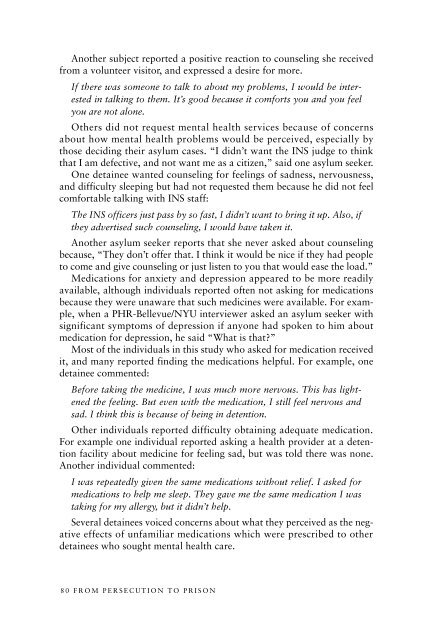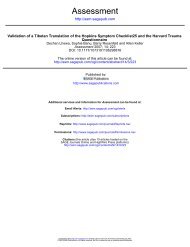From Persecution to Prison - Bellevue/NYU Program for Survivors of ...
From Persecution to Prison - Bellevue/NYU Program for Survivors of ...
From Persecution to Prison - Bellevue/NYU Program for Survivors of ...
Create successful ePaper yourself
Turn your PDF publications into a flip-book with our unique Google optimized e-Paper software.
Another subject reported a positive reaction <strong>to</strong> counseling she receivedfrom a volunteer visi<strong>to</strong>r, and expressed a desire <strong>for</strong> more.If there was someone <strong>to</strong> talk <strong>to</strong> about my problems, I would be interestedin talking <strong>to</strong> them. It’s good because it com<strong>for</strong>ts you and you feelyou are not alone.Others did not request mental health services because <strong>of</strong> concernsabout how mental health problems would be perceived, especially bythose deciding their asylum cases. “I didn’t want the INS judge <strong>to</strong> thinkthat I am defective, and not want me as a citizen,” said one asylum seeker.One detainee wanted counseling <strong>for</strong> feelings <strong>of</strong> sadness, nervousness,and difficulty sleeping but had not requested them because he did not feelcom<strong>for</strong>table talking with INS staff:The INS <strong>of</strong>ficers just pass by so fast, I didn’t want <strong>to</strong> bring it up. Also, ifthey advertised such counseling, I would have taken it.Another asylum seeker reports that she never asked about counselingbecause, “They don’t <strong>of</strong>fer that. I think it would be nice if they had people<strong>to</strong> come and give counseling or just listen <strong>to</strong> you that would ease the load.”Medications <strong>for</strong> anxiety and depression appeared <strong>to</strong> be more readilyavailable, although individuals reported <strong>of</strong>ten not asking <strong>for</strong> medicationsbecause they were unaware that such medicines were available. For example,when a PHR-<strong>Bellevue</strong>/<strong>NYU</strong> interviewer asked an asylum seeker withsignificant symp<strong>to</strong>ms <strong>of</strong> depression if anyone had spoken <strong>to</strong> him aboutmedication <strong>for</strong> depression, he said “What is that?”Most <strong>of</strong> the individuals in this study who asked <strong>for</strong> medication receivedit, and many reported finding the medications helpful. For example, onedetainee commented:Be<strong>for</strong>e taking the medicine, I was much more nervous. This has lightenedthe feeling. But even with the medication, I still feel nervous andsad. I think this is because <strong>of</strong> being in detention.Other individuals reported difficulty obtaining adequate medication.For example one individual reported asking a health provider at a detentionfacility about medicine <strong>for</strong> feeling sad, but was <strong>to</strong>ld there was none.Another individual commented:I was repeatedly given the same medications without relief. I asked <strong>for</strong>medications <strong>to</strong> help me sleep. They gave me the same medication I wastaking <strong>for</strong> my allergy, but it didn’t help.Several detainees voiced concerns about what they perceived as the negativeeffects <strong>of</strong> unfamiliar medications which were prescribed <strong>to</strong> otherdetainees who sought mental health care.80 FROM PERSECUTION TO PRISON



